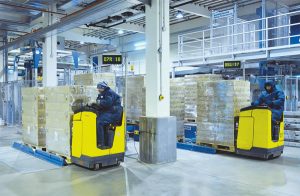What Are Cold Storage Facilities?
Introduction
Cold storage facilities play a crucial role in modern supply chain management, ensuring the preservation and safekeeping of temperature-sensitive goods and perishable items. These specialized storage spaces maintain a controlled environment, keeping products at specific low temperatures to extend their shelf life and maintain their quality. In this article, we will delve into the concept of cold storage facilities, their importance, and the various industries that heavily rely on them.
The Purpose and Function of Cold Storage Facilities
1. Extending Shelf Life
One of the primary reasons for using cold storage facilities is to extend the shelf life of products. Many perishable items, such as fruits, vegetables, dairy products, and meats, are susceptible to spoilage caused by bacterial growth, enzymatic reactions, and other factors. By storing these items at low temperatures, the rate of deterioration is significantly slowed down, allowing them to remain fresh for longer periods.
2. Preserving Quality
Cold storage facilities help preserve the quality of products during transportation and storage. For example, certain pharmaceuticals, vaccines, and biological samples require specific temperature conditions to maintain their efficacy. Likewise, maintaining precise temperature control for products like chocolates prevents them from developing unsightly white spots due to temperature fluctuations, ensuring they reach the consumer in perfect condition.
3. Managing Seasonal Demand
In the food industry, the demand for certain products can vary significantly based on the season. Cold storage facilities enable the storage of surplus produce during peak seasons, allowing for a continuous supply throughout the year. This helps stabilize prices and ensures that consumers have access to a wide variety of fresh produce, regardless of the season.
4. Reducing Wastage
Cold storage facilities are instrumental in reducing food wastage. According to the Food and Agriculture Organization (FAO), approximately one-third of the food produced globally is lost or wasted. By providing a means to preserve perishable goods, cold storage facilities help prevent spoilage and minimize wastage, contributing to a more sustainable food supply chain.
Types of Cold Storage Facilities
1. Refrigerated Warehouses
Refrigerated warehouses are large-scale facilities designed to store vast quantities of temperature-sensitive goods. These warehouses have sophisticated cooling systems that maintain the desired temperature and humidity levels. They are commonly used for storing perishable food items and pharmaceuticals before they are distributed to retailers.
2. Blast Freezers
Blast freezers are specialized units used to rapidly freeze products, preserving their quality and nutritional value. These freezers are commonly employed in the fishing and seafood industry, where freshly caught fish need to be quickly frozen to maintain their freshness until they reach consumers.
3. Cold Rooms
Cold rooms are smaller, portable cold storage units often used in restaurants, hotels, and grocery stores to store perishable goods in small quantities. They are ideal for storing fruits, vegetables, and dairy products that require refrigeration to remain fresh.
4. Refrigerated Containers
Refrigerated containers, also known as “reefers,” are used for transporting temperature-sensitive goods via trucks, ships, or trains. These containers are equipped with built-in refrigeration units, allowing products to maintain their required temperature during transit.
Industries That Depend on Cold Facilities
1. Food Industry
The food industry heavily relies on cold storage facilities to preserve the quality and safety of perishable items. This includes fresh produce, dairy products, meat, seafood, and frozen goods. Without cold storage, the food supply chain would face significant challenges in maintaining the freshness of products from farm to fork.
2. Pharmaceutical Industry
Pharmaceutical companies use cold storage facilities to store temperature-sensitive drugs and vaccines. These facilities adhere to strict temperature regulations to ensure that medications maintain their effectiveness and remain safe for consumption.
3. Floral Industry
The floral industry also benefits from cold storage facilities to extend the shelf life of cut flowers. Flowers are stored at specific temperatures to slow down the wilting process and maintain their freshness until they reach consumers or florists.
4. Biotechnology and Research
Biotechnology companies and research institutions rely on cold storage to preserve biological samples, DNA, RNA, and various lab reagents. Maintaining stable temperature conditions is critical for preserving the integrity of these valuable materials.

Challenges and Considerations
1. Energy Consumption
Storage facilities consume substantial amounts of energy to maintain the required low temperatures consistently. As the demand for cold storage increases, so does the need for energy-efficient solutions to reduce the environmental impact and operational costs.
2. Temperature Monitoring and Maintenance
Maintaining precise temperature control is essential in storage facilities. Any fluctuations or deviations from the required temperature range can compromise the quality and safety of stored goods. Regular monitoring and maintenance of cooling systems are crucial to prevent such issues.
3. Transportation Logistics
Transporting temperature-sensitive goods requires specialized vehicles and equipment to maintain the cold chain throughout the journey. Any disruptions during transportation can lead to product spoilage, resulting in financial losses for businesses and potential risks for consumers. https://commgen.com.au/latest-updates/
Conclusion
Cold storage facilities are vital components of the modern supply chain, preserving the quality and safety of temperature-sensitive goods. By extending shelf life, reducing wastage, and ensuring a continuous supply of perishable items, these facilities play a critical role in various industries, including food, pharmaceuticals, and biotechnology. As technology advances, addressing challenges like energy consumption and transportation logistics will continue to enhance the efficiency and sustainability of cold storage operations, making them even more indispensable in the global economy.

Recent Comments